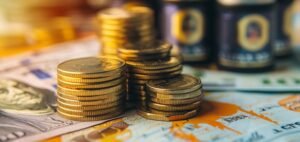Saudi Arabia’s Ministry of Finance has released its pre-budget statement for fiscal year 2025, foreseeing revenues in the range of SR1.18 trillion or $315.73 billion. The ministry reduced the forecast by 4 percent compared with prior estimates due to continuous challenges and geopolitical risks that suffocate the global economy.
The government has maintained a robust fiscal framework to address these uncertainties. Indeed, whereas gross budgeted expenditures are now set at SR1.28 trillion for the first time, the budgeted deficit is expected to come in at SR101 billion, 38 percent above prior estimates. More importantly, this is a relatively modest deficit, at 2.3 percent of GDP. This will more likely sustain in the medium term considering the current spending policy-oriented expansionary policy.
Finance Minister Mohammed Al-Jaadan stated that the pre-budget statement report for fiscal year 2025 confirms that the Saudi government will continue focusing on essential services for citizens and residents, as well as strategic projects that aim for achieving economic growth and sustainable development. Meanwhile, the ministry also rescheduled its FY 2024 estimates as it projected revenues at SR1.24 trillion-which is a 6 percent increase from earlier forecasts. Estimate for the current fiscal year is expected to be around SR1.35 trillion and in this way is likely to realize a deficit of SR118 billion stemming from escalated expenditure.
These steps are in consonance with Saudi Vision 2030, which is finely crafted on financial and monetary reform oriented toward witnessing the strong fiscal position and tremendous financial reserve complemented with low debt and seeing the public debt and effective spending. Diversification of the economy and sustainable growth-enhancing projects enjoy the prime importance.
This budget also identifies transformative spending initiatives that can tap sovereign funds while empowering private and nonprofit sectors. Under Vision 2030, efforts are devoted towards the development of promising sectors, attraction of investments, stimulation of local industries, and expansion of non-oil exports. Tourism and entertainment have grown immensely, supported by Public Investment Fund efforts to boost the non-oil sectors.
Saudi Arabia and OPEC+ have cut back production to stabilize oil markets. The kingdom’s average output has been held steady at 8.96 million barrels per day since the start of FY2024 until July. A new deal among participating states, led by Saudi Arabia, Russia, and the UAE, will extend voluntary production cuts from January FY2025. The ministry further projects that real GDP would grow by 0.8 percent during 2024, mainly driven by an estimated increase of 3.7 percent in non-oil activities. Until now, the private consumption has been doing much better than the projections, as it grew by 2.4 percent in the first half of 2024, mainly driven by the developments of the wholesale and retail trade.




